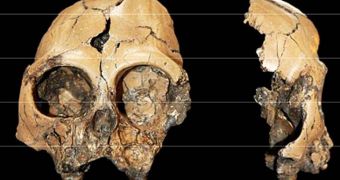A very rare fossilized ape cranium has recently been uncovered at a site in China's Yunnan Province.
Researchers say that, according to their investigations, the cranium dates back to the Miocene period, which extends from roughly 23 million to 5 million years ago.
The site where the fossilized remains were found is estimated to be some 6 million years old, sources say.
By the looks of it, the cranium belongs to a juvenile ape dubbed Lufengpithecus.
Up until now, only one other nearly complete cranium belonging to a young ape that lived in the Miocene period has been discovered by researchers.
“The preservation of the cranium is excellent. This is important because all previously discovered adult crania of the species…were badly crushed and distorted,” researcher Nina Jablonski explains.
Specialists explain that the discovery of these fossils will help them better understand how apes evolved over the years.

 14 DAY TRIAL //
14 DAY TRIAL //